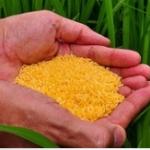Let's get something straight right away.
beta-carotene
I spoke with John Batchelor most recently about Golden Rice, a groundbreaking genetically engineered crop created by German scientists in the 1980s and ’90s, and hailed as a miraculous solution to vitamin A deficiency, which plagues millions world
Actually, I want more than just having Golden Rice — I want it to be widely available to people who eat rice as a staple food.
One of the potentially most valuable products of genetic engineering — public health-wise — was Golden Rice. This is rice which has genes added to it which allow the plant to make beta-carotene in its grain.
The latest news from Washington is both tasty and satisfying: Food and Drug Administration Commissioner David Kessler has agreed with his scientific advisory panel and approved Olestra, the first noncaloric fat replacer, for limited use.







